St. Francis of Assisi Weekly Reflections

My Kingdom Does Not Belong To This World
11-24-2024Weekly ReflectionWe Celebrate Worship Resource, Vol. 49, No. 1You can feel Pilate’s sigh of relief when Jesus told him that his kingdom did not belong to this world. Little did he realize that Jesus’ kingdom, the kingdom of God, dwarfed the entire Roman empire, both in size and permanence.
We recently heard Jesus tell a scribe, “You are not far from the kingdom of God” (Mark 12:34). Why? Because he immediately understood why loving God with your whole self and loving your neighbor as yourself were the greatest of all the commandments. This is the kingdom the scribe understands but Pilate never will. It is a kingdom won not by conquest or might, but by love of God and love of neighbor. It is a kingdom not gained through dominance, but through sacrifice.
Jesus sacrificed himself out of love of God, as proven by his obedience to his Father’s will, and love of neighbor, as evidenced by his dying for the sins of us all. May we learn the lesson Pilate never did: that the true kingdom is not of this world, but that love of God and love of neighbor will take us there.
Would Jesus say that you are not far from the Kingdom of God?
Mi Reino No Es De Este Mundo
Podemos sentir el suspiro de alivio de Pilato cuando Jesús le dijo que su reino no pertenecía a este mundo. No se daba cuenta de que el reino de Jesús, es el reino de Dios y empequeñecía a todo el imperio romano, tanto en tamaño como en permanencia.
Hace poco escuchamos a Jesús decirle a un escriba: “No estás lejos del reino de Dios” (Marcos 12:34). ¿Por qué? Porque comprendió de inmediato por qué amar a Dios con todo tu ser y amar al prójimo como a sí mismo era el mayor de todos los mandamientos. Este es el reino que el escriba entiende, pero Pilato nunca entenderá. Es un reino que no se gana por conquista o por poder, sino por amor a Dios y al prójimo. Es un reino que no se obtiene a través del dominio, sino a través del sacrificio.
Jesús se sacrificó por amor a Dios, como lo demuestra su obediencia a la voluntad de su Padre, y por amor al prójimo, como lo demuestra su muerte por los pecados de todos nosotros. Aprendamos la lección que Pilato nunca aprendió: que el verdadero reino no es de este mundo, pero que el amor a Dios y al prójimo nos llevarán allí.
¿Diría Jesús que no estás lejos del Reino de Dios?
—We Celebrate Worship Resource, Vol. 49, No. 2
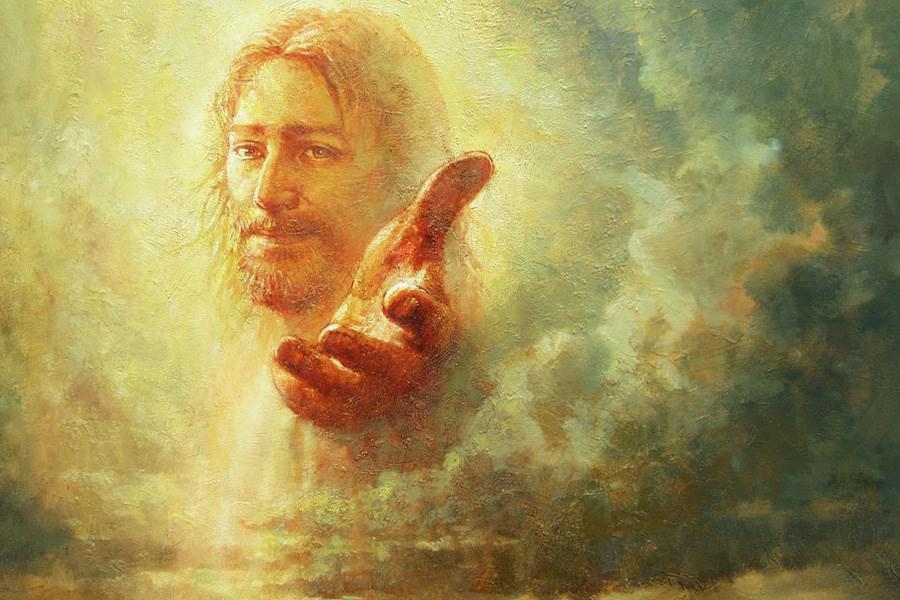
The Son of Man Coming in the Clouds
11-17-2024Weekly ReflectionWe Celebrate Worship Resource, Vol. 49, No. 1The stars have had a special symbolic significance going back to the beginning of our faith. God told Abraham to look at the stars in the night sky, promising him that his descendants will one day be as numerous. Today we hear that in Daniel’s prophetic vision, “those who lead the many to justice shall be like the stars forever” (Daniel 12:3). The uncountable multitude of souls guiding us to justice from their eternal home recall the uncountable multitude of stars Abraham and Sarah glimpsed in the heavens. Jesus told his disciples that while he was in the world, he was the light of the world. It is up to us now to reflect the light of Christ to the world, to be beacons for others, to make the works of God visible. One day the Lord will return to gather his elect and bring them home to the Father. May his warning that no one knows when this will happen spur us to action, to provide light to our world now, whether the world ends soon or far, far in the future.
How do you reflect the light of Christ in the world? What more can you do to shine that light in the darknesses around you?
El Hijo del Hombre viene en las nubes
Las estrellas han tenido un significado simbólico especial desde el comienzo de nuestra fe. Dios le dijo a Abraham que mirara las estrellas en el cielo nocturno, prome éndole que un día sus descendientes serían tan numerosos como ellos. Hoy escuchamos que en la visión profé ca de Daniel, “los que conducen a la mul tud a la jus cia serán como las estrellas por siempre” (Daniel 12:3). La incontable multitud de almas que nos guían hacia la jus cia desde su hogar eterno recuerda la incontable multitud de estrellas que Abraham y Sara vislumbraron en los cielos. Jesús dijo a sus discípulos que mientras él estaba en el mundo, era la luz del mundo. Ahora nos toca a nosotros reflejar la luz de Cristo al mundo, ser faros para los demás, hacer visibles las obras de Dios. Un día, el Señor regresará para reunir a sus elegidos y llevarlos a casa con el Padre. Que su advertencia de que nadie sabe cuándo sucederá esto nos impulse a la acción, para brindar luz a nuestro mundo ahora, ya sea que el mundo termine pronto o muy, muy lejos en el futuro.
¿Cómo reflejas la luz de Cristo en el mundo? ¿Qué más puedes hacer para que esa luz brille en las nieblas que te rodean?
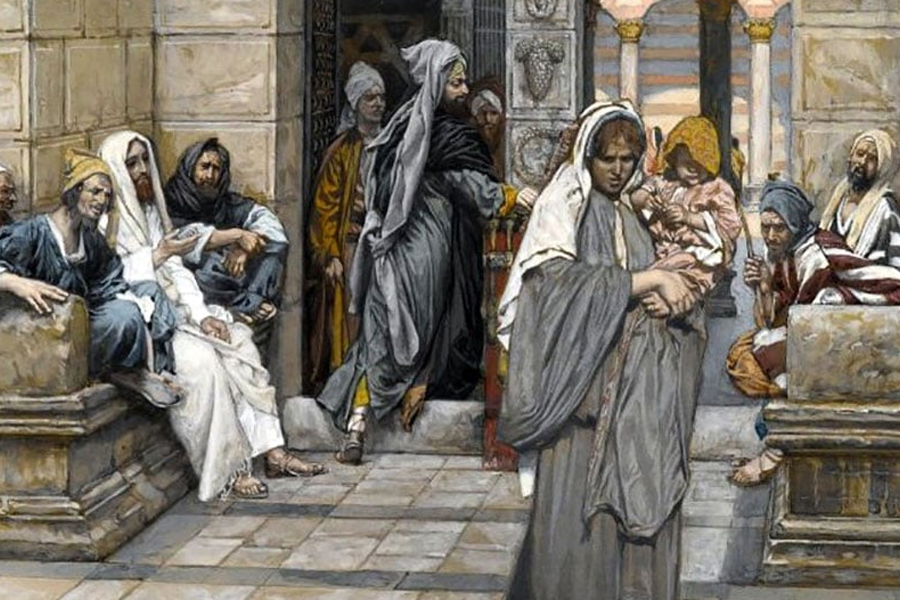
She Contributed All That She Had
11-10-2024Weekly ReflectionWe Celebrate Worship Resource, Vol. 49, No. 1We just heard Jesus teach what love of God and love of neighbor are the most important of all God's commandments. Today we meet two people who have taken this to heart. Each is a widow. Each sacrifices her own well-being to give all that she has to God and neighbor. In the first reading, a widow has hardly anything left to give her young son. She expects that they will soon die of hunger. But she gives the last of her bread and water to this stranger, this man of God, rather than kingly telling him no, that she can't spare any of what little she has left. In the Gospel, a widow contributes two coins to the temple treasury-all she had-as an offering to God and to those in need. The incredible sacrifice each woman makes would look foolish to many. But note that not long after this incident, Jesus will look foolish to many, sacrificing his life on the cross for our salvation. The two selfless women sacrifice all that they have as well, not knowing how they will survive themselves, but believing that generosity to God and to neighbor is more important.
How generous are you? How can you bring yourself to be more generous to God and others?
DIO TODO LO QUE TENIA
Acabamos de escuchar a Jesús enseñar que el amor a Dios y al prójimo son los mandamientos más importantes de Dios. Hoy nos encontramos con dos personas que se lo han tomado muy en serio. Ambas son viudas. Cada una sacrifica su propio bienestar para dar todo lo que ene a Dios y al prójimo. En la primera lectura, una viuda no ene casi nada para darle a su hijo pequeño. Ella espera que pronto mueran de hambre. Pero ella le da lo úl mo que le queda de pan y agua a este extraño, este hombre de Dios, en lugar de decirle majestuosamente que no, que no puede prescindir de nada de lo poco que le queda. En el Evangelio, una viuda contribuye con dos monedas al tesoro del templo, todo lo que tenía, como ofrenda a Dios y a los necesitados. El increíble sacrificio que hace cada mujer parecería tonto para muchos. Pero note que no mucho después de este incidente, Jesús parecerá tonto para muchos, sacrificando su vida en la cruz por nuestra salvación. Las dos mujeres desinteresadas también sacrifican todo lo que enen, sin saber cómo sobrevivirán, pero creyendo que la generosidad hacia Dios y el prójimo es más importante.
¿Qué tan generoso eres? ¿Cómo puedes ser más generoso con Dios y con los demás?

The Greatest Commandment
11-03-2024Weekly ReflectionWe Celebrate Worship Resource, Vol. 49, No. 1It is incredibly rewarding for a teacher to see or hear that glimmer of understanding in a student, especially in a student who has failed to comprehend earlier lessons. Scribes had consistently failed to understand Jesus. They were more concerned about keeping Sabbath practices and eating with clean hands than about doing good for others. But today we meet a scribe who, when told that the greatest of all commandments is to love God with our whole self and to love our neighbor as ourselves, immediately points out that these are worth more than all the offerings made in the temple. Jesus, seeing that he “got it,” assures him, “You are not far from the kingdom of God” (Mark 12:34). We just honored the saints, whom we believe are in God’s kingdom. This is our goal as well. Today we are reminded of the means to that goal. The love and care that we have for ourselves must be turned outward, toward God and our neighbor. This sacrifice—not one of the burnt offerings, but the selfless one Jesus modeled for us on the cross—is the sacrifice Jesus calls us to make.
How will you show that you too understand the greatest commandment?
El Gran Mandamiento
Es increíblemente gratificante para un maestro ver u oír ese destello de comprensión en un estudiante, especialmente en un estudiante que no ha comprendido las lecciones anteriores. Los escribas habían fracasado constantemente en entender a Jesús. Estaban más preocupados por guardar las prácticas del sábado y comer con las manos limpias que por hacer el bien a los demás. Pero hoy nos encontramos con un escriba que, cuando se le dice que el mayor de todos los mandamientos es amar a Dios con todo nuestro ser y amar al prójimo como a nosotros mismos, inmediatamente señala que estos valen más que todas las ofrendas que se hacen en el templo. Jesús, viendo que lo había entendido, le asegura: “No estás lejos del reino de Dios” (Marcos 12:34). Acabamos de honrar a los santos, quienes creemos que están en el reino de Dios. Este es también nuestro objetivo. Hoy se nos recuerda el medio para alcanzar ese objetivo. El amor y el cuidado que tenemos por nosotros mismos deben dirigirse hacia afuera, hacia Dios y hacia el prójimo. Este sacrificio —no el de un holocausto, sino el desinteresado que Jesús modeló para nosotros en la cruz—es el sacrificio que Jesús nos llama a hacer.
¿Cómo demostrarás que tú también en endes el mayor mandamiento?
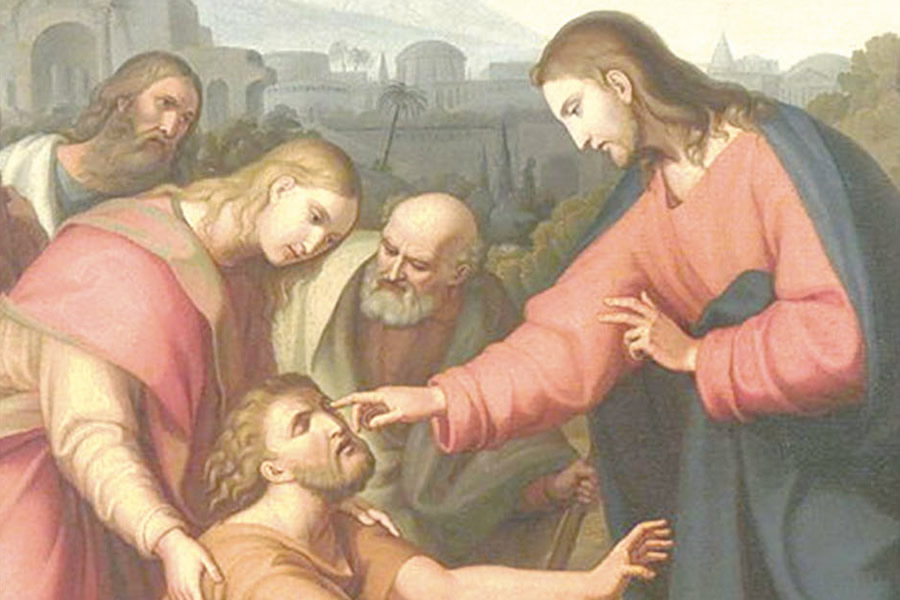
“Master, I Want to See”
10-27-2024Weekly ReflectionWe Celebrate Worship Resource, Vol. 49, No. 1All he wanted was to see. When asked, “What do you want me to do for you?” Bartimaeus responded simply, “Master, I want to see” (Mark10:51). He trusts Jesus, calling him “Master”, even throwing aside his cloak, which he’d used to collect the offering. What’s more, after receiving his sight, he immediately followed the Lord. Contrast this with others we’ve heard of recently. Last week, we heard Jesus ask the same exact question of James and John, but what they wanted was a special place in the eternal kingdom. Two weeks ago, we saw a man walk away when he was told he must sell all he had and give it to the poor in order to inherit eternal life. James, John, and the unnamed man wanted to see themselves in glory in heaven. But not Bartimaeus. He is like the blind, lame, and other vulnerable people Jeremiah speaks of in the first reading. Those people were specifically welcomed to return to the restored kingdom of Israel. Bartimaeus wants to see, but the fact that he chose to go with Jesus instead of going back home suggests that what Bartimaeus really wanted to see was the kingdom Jeremiah prophesied and Jesus promised. On this day, his wish was fulfilled.
How does your faith, like Bartimaeus’, help you see what others cannot?
“Maestro, Que Pueda Ver”
Todo lo que quería era ver. Cuando se le preguntó: "¿Qué quieres que haga por ?" Bartimeo respondió simplemente, "Maestro, quiero ver" (Mark10: 51). Con a en que Jesús lo llama "Maestro", incluso tirando a un lado su capa, que había usado para recolectar la ofrenda. Lo que es más, después de recibir su vista, inmediatamente siguió al Señor. Contraste esto con otros de los que hemos oído hablar recientemente. La semana pasada, escuchamos a Jesús hacer la misma pregunta exacta de Santiago y Juan, pero lo que querían era un lugar especial en el reino eterno. Hace dos semanas, vimos a un hombre alejarse cuando le dijeron que debía vender todo lo que tenía y dárselo a los pobres para heredar la vida eterna. James, John y el hombre no identificado querían verse a sí mismos en la gloria en el cielo. Pero no Bartimeo. Es como el ciego, cojo y otras personas vulnerables de las que Jeremiah habla en la primera lectura. Esas personas fueron bienvenidas específicamente para regresar a un reino restaurado de Israel. Bartimeo quiere ver, pero el hecho de que eligió ir con Jesús en lugar de volver a casa sugiere que lo que Barmeo realmente quería ver era el reino Jeremías profetizado y que Jesús prometió. En este día, su sueño fue cumplido.
¿Cómo te ayuda tu fe, como la de Bartimeo, ver lo que otros
no pueden?

He Came To Give
10-20-2024Weekly ReflectionWe Celebrate Worship Resource, Vol. 49, No. 1Jesus was not very explicit when he called the disciples. “Come, follow me” is a pretty vague invitation. But over time the disciples came to realize their mission. Jesus set an example for them, teaching, healing, and forgiving those who came to him. He even invited the disciples to go out in pairs and do the same. But all this recent talk about the kingdom and eternal life has distracted them. James and John decided to ask Jesus for a special place in this eternal kingdom. It is time for Jesus to summon the Twelve all over again to remind them of their mission. The goal of Christ’s mission is service, not glory. The focus is on others, not oneself. Jesus “did not come to be served but to serve” (Mark 10:45). When we were first called, we may not have understood our mission. Certainly not if we were baptized as babies! Sometimes we need to be summoned again. And again. Out of love for our neighbor, we are called to sacrifice our own desires, our own possessions (recalling last Sunday’s Gospel), and even our own lives. Let us work to recognize Christ in our neighbor, making us eager to serve others.
What will you do this week to serve others in a new way?
El Vino A Dar
Jesús no fue muy explícito cuando llamó a los discípulos. “Ven y sígueme” es una invitación bastante vaga. Pero con el tiempo los discípulos se dieron cuenta de su misión. Jesús les dio el ejemplo, enseñando, sanando y perdonando a quienes acudían a él. Incluso invitó a los discípulos a salir de dos en dos y hacer lo mismo. Pero toda esta charla reciente sobre el reino y la vida eterna los ha distraído. Santiago y Juan decidieron pedirle a Jesús un lugar especial en este reino eterno. Es hora de que Jesús vuelva a convocar a los Doce para recordarles su misión. El objetivo de la misión de Cristo es el servicio, no la gloria. El enfoque está en los demás, no en uno mismo. Jesús “no vino para ser servido, sino para servir” (Marcos 10:45). Cuando fuimos llamados por primera vez, es posible que no hayamos entendido nuestra misión. ¡Ciertamente no si fuimos bau zados cuando éramos bebés! A veces necesitamos que nos convoquen de nuevo. Y otra vez. Por amor al prójimo, estamos llamados a sacrificar nuestros propios deseos, nuestras propias posesiones (recordando el Evangelio del domingo pasado), incluso nuestra propia vida. Trabajemos para reconocer a Cristo en nuestro prójimo, lo que nos hará estar deseosos de servir a los demás.
¿Qué harás esta semana para servir a los demás de una manera nueva?

All Things Are Possible With God
10-13-2024Weekly ReflectionWe Celebrate Worship Resource, Vol. 49, No. 1After hearing today’s Gospel, we may go away just as sad as the man who asked Jesus what he must do to inherit eternal life. Sell everything we have? Is it easier to thread a needle with a camel than for a rich person to get into heaven? What?
READ MORE
The Two Shall Become One
10-06-2024Weekly ReflectionWe Celebrate Worship Resource, Vol. 49, No. 1Again and again, Jesus tries to change his followers’ perspective. He refuses to be trapped by the rules and traditions of the me, even when their origins are in Mosaic law. Today he is asked about marriage and divorce. At the time, only the husband could initiate a divorce. Jesus responds by focusing on the holiness of the marriage covenant. God has blessed the union of the pair in marriage. Their marriage is made holy by God’s presence. When two people give themselves to each other in marriage, they become a new creation, “one flesh”, as we hear twice today (Genesis 2:24; Mark 10:8). Regrettably, unforeseen impediments or irreconcilable differences can lead to the breaking of that covenant, but if divorce is used as an easy way out, the gift of marriage is trivialized. Ideally, a couple works to strengthen and nurture the bond between them, much as we strive to strengthen and nurture the bond between Christ and us, the Church. Often that means putting our faith in the Lord, as the children who come to him do, for Jesus’ embrace, after all, is the embrace of the kingdom of God.
What do you do to strengthen and nurture the bond between you and your spouse or the bond between Christ and you as the Church?
Los Dos Serán Uno
Una y otra vez, Jesús intenta cambiar la perspectiva de sus seguidores. Se niega a dejarse atrapar por las reglas y tradiciones de la época, incluso cuando sus orígenes están en la ley mosaica. Hoy se le pregunta sobre el matrimonio y el divorcio. En ese momento, solo el esposo podía iniciar un divorcio. Jesús responde centrándose en la santidad del pacto matrimonial. Dios ha bendecido la unión de la pareja en matrimonio. Su matrimonio se santifica por la presencia de Dios. Cuando dos personas se entregan el uno al otro en matrimonio, se convierten en una nueva creación, “una sola carne”, como escuchamos dos veces hoy (Génesis 2:24; Marcos 10:8). Lamentablemente, impedimentos imprevistos o diferencias irreconciliables pueden llevar a la ruptura de ese pacto, pero si el divorcio se usa como una salida fácil, el don del matrimonio se trivializa. Idealmente, una pareja trabaja para fortalecer y nutrir el vínculo entre ellos, de la misma manera que nos esforzamos por fortalecer y nutrir el vínculo entre Cristo y nosotros, la Iglesia. A menudo eso significa poner nuestra fe en el Señor, como lo hacen los niños que se acercan a Él, porque el abrazo de Jesús, después de todo, es el abrazo del reino de Dios.
¿Qué haces para fortalecer y nutrir el vínculo entre tu y tu cónyuge o el vínculo entre tu y Cristo como Iglesia?

Shepherds After My Own Heart
09-29-2024Weekly ReflectionWe Celebrate Worship Resource, Vol. 49, No. 1The second half of today’s Gospel is a tough one. Jesus says sin is so horrible that you should cut off the body part that leads you to sin. Nothing about forgiveness; the only option is to end up maimed. But the first half strikes a completely different note. If we do good things in Jesus’ name, the Lord will welcome us. Even if all we do is pour a cup of water for someone, we will be eternally rewarded. Perhaps Jesus is warning his disciples about judging the motivations of others while dismissing one’s own tendency to sin. Joshua judged the motivations of two men who dared to prophesy even though they seemingly hadn’t received the spirit. But Moses supports the two, even saying, “Would that Lord might bestow his spirit on them all!” (Numbers 11:29). The more people who are moved by the spirit to speak and act in God’s name, the better. As it happens, the Lord bestows the holy Spirit on Christians of all denominations in bap sm. With that cup of water poured over us, we are all welcomed into eternal life with the Lord.
How can you be less judgmental of others while being more honest with yourself?
Pastores Según Mi Corazón
La segunda mitad del Evangelio de hoy es dificil. Jesús dice que el pecado es tan horrible que hay que cortar la parte del cuerpo que nos lleva a pecar. No dice nada sobre el perdón; la única opción es acabar mutilado. Pero la primera mitad tiene un tono completamente diferente. Si hacemos cosas buenas en nombre de Jesús, el Señor nos recibirá. Incluso si todo lo que hacemos es servirle un vaso de agua a alguien, seremos recompensados eternamente. Tal vez Jesús está advir endo a sus discípulos acerca de juzgar las motivaciones de los demás y desestimar la propia tendencia a pecar. Josué juzgó las motivaciones de dos hombres que se atrevieron a profetizar aunque aparentemente no habían recibido el espíritu. Pero Moisés apoya a los dos, llegando a decir: “¡Ojalá que el Señor pusiera su Espíritu sobre ellos!” (Números 11:29). Cuantas más personas sean movidas por el espíritu para hablar y actuar en nombre de Dios, mejor. Resulta que el Señor otorga el Espíritu Santo a los cristianos de todas las denominaciones en el bautismo. Con ese vaso de agua derramado sobre nosotros, todos somos bienvenidos a la vida eterna con el Señor.
¿Cómo puedes ser menos crí co con los demás y al mismo tiempo ser más honesto con go mismo?

Peaceable, Gentle, Compliant, Full Of Mercy
09-22-2024Weekly ReflectionWe Celebrate Worship Resource, Vol. 49, No. 1“ Where do the wars and where do the conflicts among you come from?” James asks in the second reading (James 4:1). From jealousy, selfishness, and greed for what we don’t have, he concludes. We see these human passions playing out in today’s other readings. In Wisdom, the wicked ones torture the just one, for he stands in the way of their lawlessness. In the Gospel, while Jesus teaches his disciples that he is to suffer and die, they argue about which of them is the greatest. In both cases, people are thinking of themselves first. Others are only obstacles. We can let ourselves be swayed by the same passions; but instead, to use James’ words, we should be “peaceable, gentle, compliant, full of mercy” (James 3:17). The qualities lead us to be other-centered, not self-centered. These are qualities we admire and nurture in children, children like the ones Jesus embraces as an example of being the “last of all” (Mark 9:35). These are the qualities that we need to strive to exercise ourselves.
How do you tamp down jealousy and envy? How can you be more peaceable and merciful?
Pacíficos, Amables, Dociles, Llenos De Misricordia
“¿De dónde vienen las guerras y los conflictos entre ustedes?”, pregunta San ago en la segunda lectura (Santiago 4:1). De los celos, el egoísmo y la codicia por lo que no tenemos, concluye. Vemos estas pasiones humanas en las otras lecturas de hoy. En la Sabiduría, los malvados torturan al justo, porque se interpone en el camino de su maldad. En el Evangelio, mientras Jesús enseña a sus discípulos que él debe sufrir y morir, ellos discuten sobre quién de ellos es el más grande. En ambos casos, las personas piensan primero en sí mismas. Los demás son solamente obstáculos. Podemos dejarnos llevar por las mismas pasiones; pero en cambio, para usar las palabras de Santiago, debemos ser “pacíficos, amables, dóciles, llenos de misericordia” (Santiago 3:17). Estas cualidades nos llevan a centrarnos en los demás, no en nosotros mismos. Son cualidades que admiramos y fomentamos en los niños, niños como aquellos a quienes Jesús acoge como ejemplo de ser “los úl mos de todos” (Marcos 9:35). Son cualidades que debemos esforzarnos por ejercitar nosotros mismos.
¿Cómo podemos controlar los celos y la envidia? ¿Cómo podemos ser más pacíficos y misericordiosos?
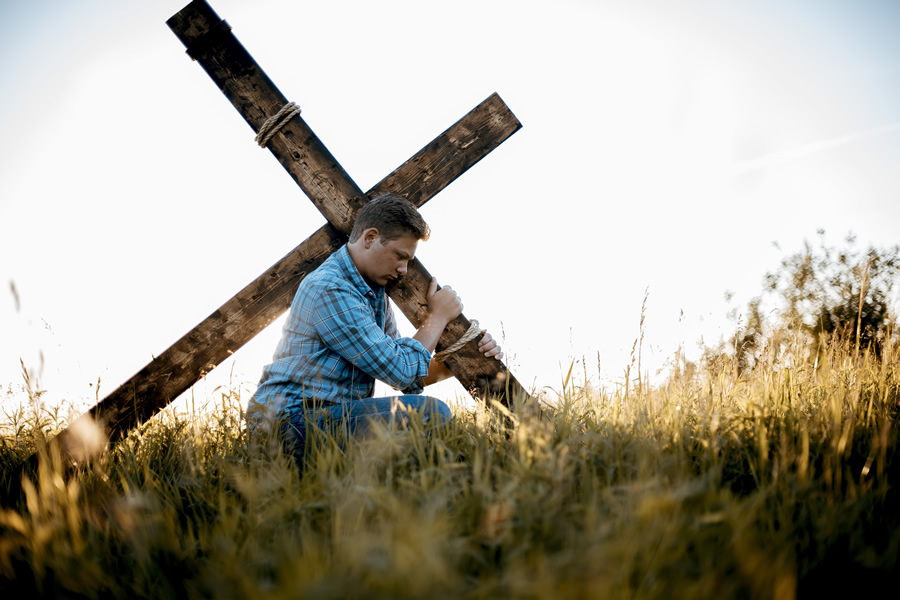
The Son Of Man Must Suffer Greatly
09-15-2024Weekly ReflectionWe Celebrate Worship Resource, Vol. 49, No. 1When Jesus asks his disciples who they say he is, Peter immediately declares, “You are the Christ” (Mark 8:29), Christ being the Greek translation of Hebrew Messiah. Poor Peter. He had it right, yet he got it all wrong. Yes, Jesus was the Messiah, but not the Messiah the disciples expected. Jesus sets them straight immediately, teaching them that he was sent to suffer and die. Peter cannot accept this. The disciples had just seen him cure yet another person and confront the religious authorities. Shouldn’t the Messiah continue doing both, eventually ending all their infirmities an triumphing over their oppressors? Isaiah was closer to seeing things from God’s perspective. People spat in his face, but Isaiah was willing to face the next confrontation because he trusted that God was with him. Jesus tells his disciples that they too must deny themselves, take up their crosses, and follow him. This is our challenge now. Today, as we receive Christ in word and sacrament, we unite with him in carrying our crosses. We will suffer, but our suffering is made holy by his presence.
How can knowing that Christ is with you in your suffering make it easier for you to cope with carrying your cross?
El Hijo Del Hombre Tendrá Que Sufrir Mucho
Cuando Jesús les pregunta a sus discípulos quién dicen que es él, Pedro declara inmediatamente: “Tú eres el Cristo” (Marcos 8:29), siendo Cristo la traducción griega del Mesías hebreo. Pobre Pedro. Tenía razón, pero se equivocó. Sí, Jesús era el Mesías, pero no el Mesías que los discípulos esperaban. Jesús los corrige de inmediato, enseñándoles que fue enviado a sufrir y morir. Pedro no puede aceptar esto. Los discípulos acababan de verlo curar a otra persona y enfrentarse a las autoridades religiosas. ¿No debería el Mesías con nuar haciendo ambas cosas, terminando finalmente con todas sus enfermedades y triunfando sobre sus opresores? Isaías estaba más cerca de ver las cosas desde la perspec va de Dios. La gente le escupió en la cara, pero Isaías estaba dispuesto a enfrentar la siguiente confrontación porque confiaba en que Dios estaba con él. Jesús les dice a sus discípulos que ellos también deben negarse a sí mismos, tomar sus cruces y seguirlo. Este es nuestro desa o ahora. Hoy, cuando recibimos a Cristo en la palabra y el sacramento, nos unimos a él para llevar nuestras cruces. Sufriremos, pero nuestro sufrimiento se hace san ficado por su presencia.
¿Cómo puede el saber que Cristo está con go en tu sufrimiento hacer que sea más fácil para sobrellevar tu cruz?
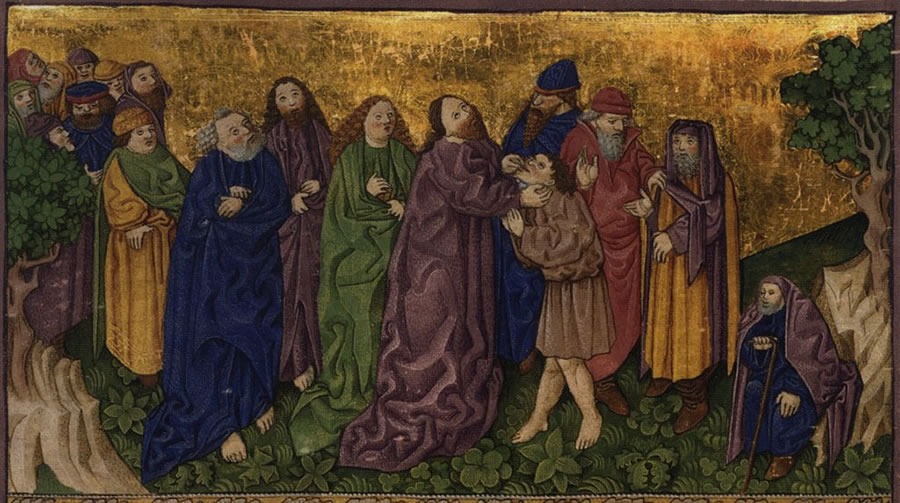
He Makes The Deaf Hear
09-08-2024Weekly ReflectionWe Celebrate Worship Resource, Vol. 49, No. 1Rarely do the evangelists give us the exact words Jesus spoke in Aramaic, but we hear one today: “Ephphatha!” which helpfully translates for his Greek-speaking audience as a command meaning, “Be opened! Jesus says it after touching the ears and tongue of the man with hearing and speech impediments. Note that Jesus did not say, “Listen!” or “Speak!” In saying “Be opened!” he is saying more than that he has cured those faculties. He is telling the man to open himself up to a new world. By keeping the original language, Mark is telling his readers, then and now, to do the same. Are our ears closed to God’s word? “Ephphatha!” Do we keep our mouths closed when we could boldly proclaim the Good News? “Ephphatha!”Ê James gives an example in the second reading, asking if we avoid a poor person with shabby clothes while welcoming someone in fine clothes. Are we listening to what Jesus teaches? What are we proclaiming with our actions if we ignore or mistreat someone based on their outer appearance? James reminds us: who did Jesus say would inherit the kingdom of God? May we open our ears, our lips, and our hearts to God’s word made flesh.
How can you listen to God’s word with new ears and proclaim it with a new voice?
Él Hace Oír A Los Sordos
En raras ocasiones los evangelistas nos dan las palabras exactas que Jesús pronunció en arameo, pero hoy escuchamos una: “¡Effatá!”, que se traduce para su audiencia de habla griega como una orden que significa “¡Ábrete!”. Jesús lo dice después de tocar los oídos y la lengua del hombre con impedimentos audi vos y del habla. Nótese que Jesús no dijo “¡Escucha!” o “¡Habla!”. Al decir “¡Ábrete!”, está diciendo más que ha curado esas facultades. Está diciendo al hombre que se abra a un mundo nuevo. Al mantener el idioma original, Marcos está diciendo a sus lectores, entonces y ahora, que hagan lo mismo. ¿Están cerrados nuestros oídos a la palabra de Dios? “¡Effatá!”. ¿Mantenemos nuestras bocas cerradas cuando podríamos proclamar con valen a la Buena Nueva? “¡Effatá!”. San ago da un ejemplo en la segunda lectura, preguntando si evitamos a una persona pobre con ropa raída mientras damos la bienvenida a alguien con ropa f ina. ¿Estamos escuchando lo que Jesús enseña? ¿Qué proclamamos con nuestras acciones si ignoramos o maltratamos a alguien por su apariencia exterior? Santiago nos recuerda: ¿quién dijo Jesús que heredaría el reino de Dios? Abramos nuestros oídos, nuestros labios y nuestros corazones a la palabra de Dios hecha carne.
¿Cómo podemos escuchar la palabra de Dios con oídos nuevos y proclamarla con una voz nueva?

Create In Me A Clean Heart, O God
09-01-2024Weekly ReflectionWe Celebrate Worship Resource, Vol. 49, No. 1Many of us wince to see Jesus’ disciples sit down to a meal without washing their hands first. But Mark did not include this vignette in his Gospel to show that Jesus taught bad hygiene. No, Jesus is teaching the difference between God’s commands and human traditions. The religious authorities taught that washing one’s hands before eating was a matter of ritual purity, but that mattered not a whit to Jesus. Recall that in the story of the good Samaritan, the priest, and the Levite sinned when they chose safeguarding their ritual purity over assisting the stranger in need. Ritual and tradition are important, certainly, but God’s law is supreme. This is what Moses taught, proclaiming that no human law could be as just or wise as God’s. Jesus adds to this by identifying the human heart, not dirty hands, as the source of the evils that defile. We are to look into our hearts for sins and failings, not judge the actions of others. Let us heed James’ words in the second reading: Caring for those in need can keep us undefiled before God.
What attitude in your heart leads you to sin or prevents you from doing good?
Crea En Mi Un Corazón Puro, Señor
Muchos de nosotros nos estremecemos al ver a los discípulos de Jesús sentarse a comer sin lavarse las manos primero. Pero Marcos no incluyó esta viñeta en su Evangelio para mostrar que Jesús enseñaba una mala higiene. No, Jesús está enseñando la diferencia entre los mandamientos de Dios y las tradiciones humanas. Las autoridades religiosas enseñaban que lavarse las manos antes de comer era una cues ón de pureza ritual, pero eso no le importaba en absoluto a Jesús. Recordemos que en la historia del buen samaritano, el sacerdote y el levita pecaron cuando eligieron salvaguardar su pureza ritual en lugar de ayudar al extraño necesitado. El ritual y la tradición son importantes, sin duda, pero la ley de Dios es suprema. Esto es lo que enseñó Moisés, proclamando que ninguna ley humana podría ser tan justa o sabia como la de Dios. Jesús añade a esto iden ficando el corazón humano, no las manos sucias, como la fuente de los males que contaminan. Debemos mirar dentro de nuestro corazón en busca de pecados y fallas, no juzgar las acciones de los demás. Prestemos atención a las palabras de San ago en la segunda lectura: Cuidar a los necesitados puede mantenernos puros ante Dios.
¿Qué actitud de tu corazón te lleva a pecar o te impide hacer el bien?